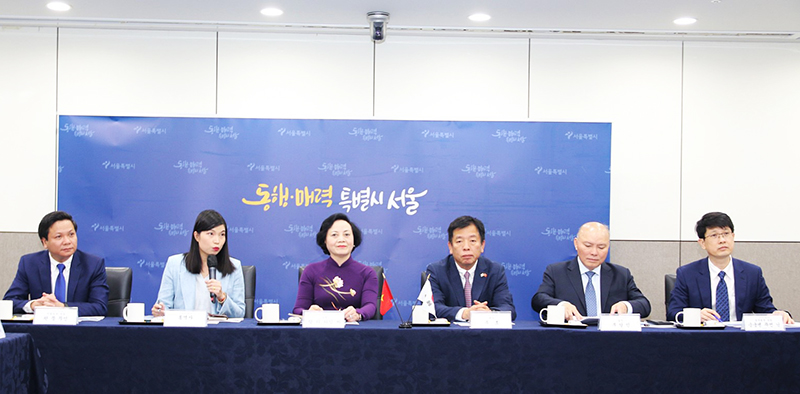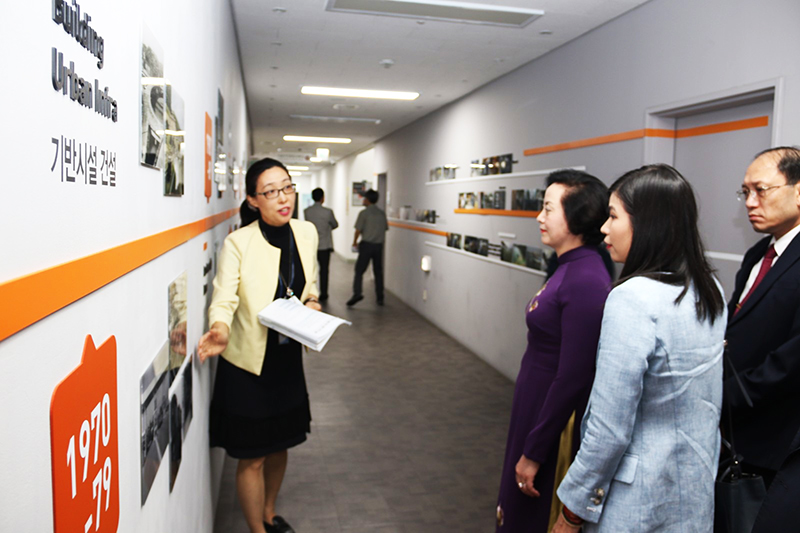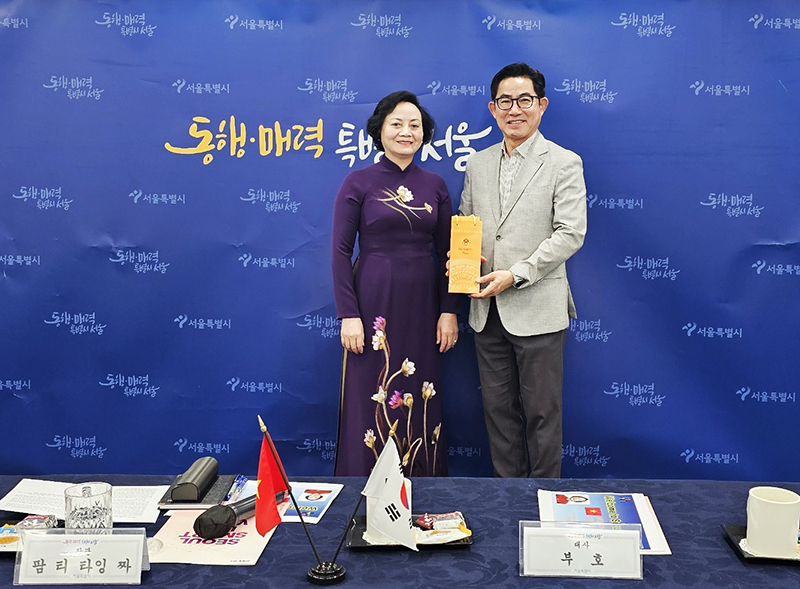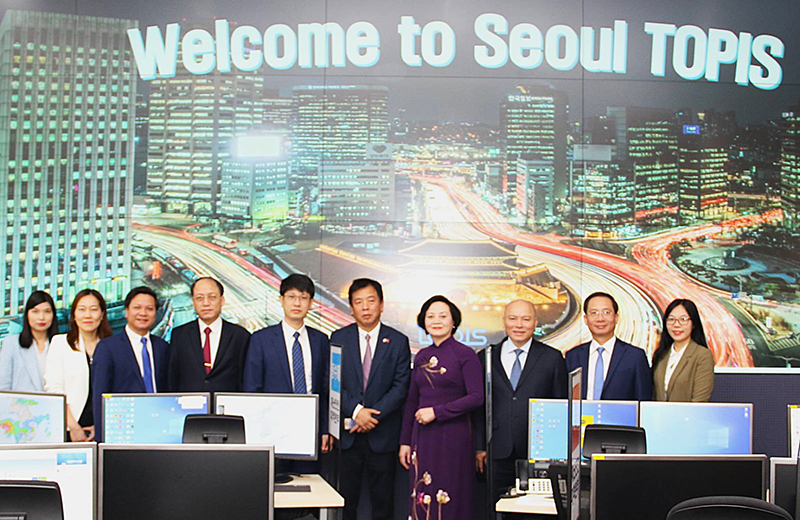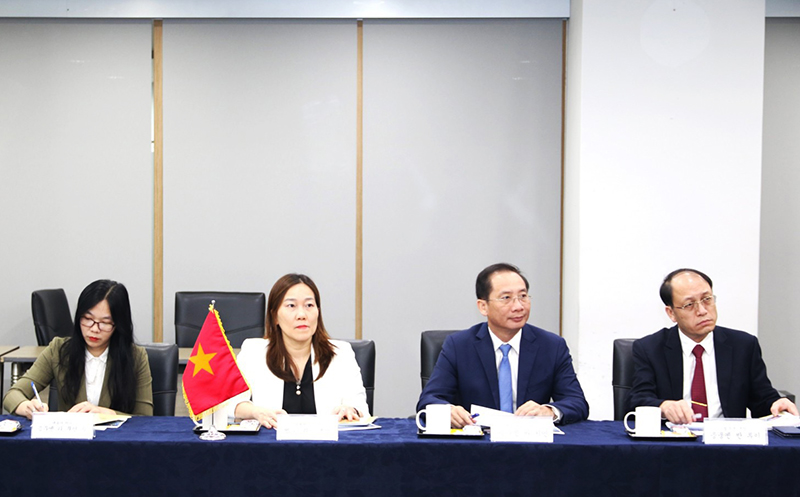On July 16, 2024, as part of her working trip to South Korea, the Vietnamese Ministry of Home Affairs (MoHA) delegation, led by Minister Pham Thi Thanh Tra, had a working session on smart cities with the Seoul metropolitan government. Assoc. Prof. Dr. Nguyen Ba Chien, NAPA President, is also a member of the delegation.
The delegation was received by Mr. Park Jin Young, Director General of the City Government’s Digital Policy Bureau, Seoul, and leaders of relevant departments.
At the session, Minister Pham Thi Thanh Tra expressed her gratitude to Mr. Park Jin Young, Director General of the City Government’s Digital Policy Bureau, Seoul, and the leaders of the relevant departments for receiving the Vietnamese MoHA delegation.
She stated that Viet Nam is investing in building smart cities, but the results still need to meet expectations. Therefore, MoHA chose Seoul as a model city to learn from. Minister Pham Thi Thanh Tra and the delegation were very eager to hear from the Seoul city leaders about the construction of a smart city and related topics such as the essential basic policies for developing smart urban cities and promoting digital citizenship and evaluating the effectiveness of smart cities through the application of information technology.
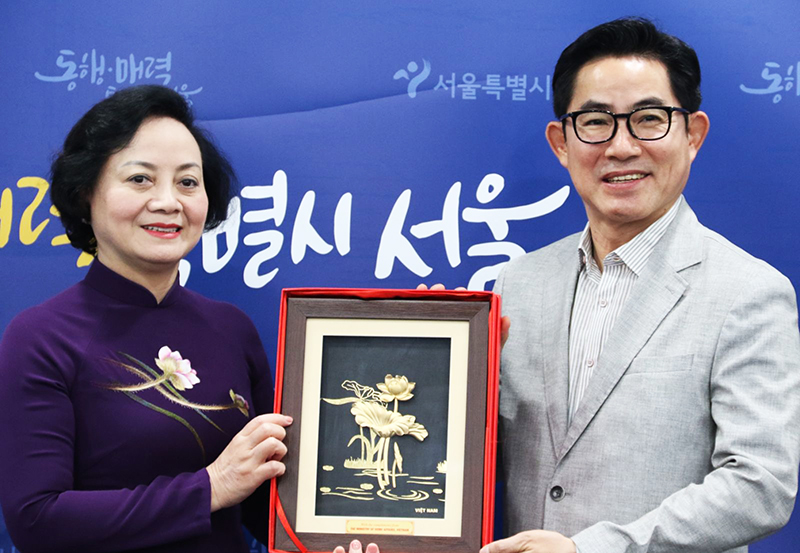
Minister Pham Thi Thanh Tra (L) and Mr. Park Jin Young, Director General of the City Government’s Digital Policy Bureau, Seoul.
Mr. Park Jin Young expressed his pleasure at working with Minister Pham Thi Thanh Tra and the Vietnamese MoH delegation on smart cities.
He stated that building a smart city is a combination of digital technology and city management policies. Seoul focuses on bringing every digital value to provide convenience for its citizens. He also hoped that with their experience, these shared insights would be helpful for Viet Nam in researching and applying to its smart city development.
According to him, this field also requires the public and private sectors cooperation. Additionally, mechanisms and policies are necessary to allow the private sector to develop, which can then be applied within government agencies.
Furthermore, financial support is necessary for both central and local governments. The central government needs to provide technological and equipment support to localities, helping them have the conditions to participate in the digital transformation and digitization process and thus possess capabilities to independently develop digital projects.
In the RoK, the government continues to formulate appropriate mechanisms and policies while allocating budgets to support localities’ self-development through specific digital projects.
According to Mr. Park Jin Young, the RoK government has identified and focused on six areas to build a smart city:
(1) Ensuring Access to Free Wi-Fi Nationwide: Free Wi-Fi is available throughout the city, allowing everyone, including foreigners, to connect and access the Internet. This minimizes costs for vulnerable groups and ensures accessibility for all citizens.
(2) Introducing Autonomous Buses: Autonomous buses operate in the early mornings to serve the public. Citizens use public transport tickets to travel on various modes of transportation, aiming to reduce the number of private vehicles on city roads.
(3) Providing Equal Access to Education and Training Services: Efforts include offering digital economy and technology training projects for the elderly to ensure everyone has fair access to education and training.
(4) Delivering Smart Healthcare Services: Smart healthcare services are provided to ensure better health care for all citizens.
(5) Enhancing Social Welfare and Public Safety: Emphasis is placed on reducing crime, responding to natural disasters, and providing rescue services. Digital technology benefits all citizens, regardless of age, and services are deployed to ensure the disadvantaged can access them.
(6) Facilitating Easy Use of Public Data: The city has established open data centers and eight large data centers (public and private data) to support startups, increase foreign direct investment in Seoul, and promote the use of artificial intelligence (AI) in city operations to better serve the public.
Mr. Park Jin Young also added that starting from 2024, Seoul will host a “Smart City Week” event to serve the citizens, especially vulnerable groups, allowing them to benefit from the achievements of the smart city.
Minister Pham Thi Thanh Tra expressed sincere thanks and highly appreciated Mr. Park Jin Young’s heartfelt sharing on building a smart city. She emphasized that through learning and sharing experiences, the MoHA of Viet Nam would assign relevant agencies and functional units to continue researching and selectively adopting suitable practices from the smart city development in Seoul for application in building smart cities in Viet Nam.
During the working session, the delegation also visited the Smart Seoul Exhibition Hall and the Seoul Transport Operation and Information Service (TOPIS).
Some photos of the delegation:


